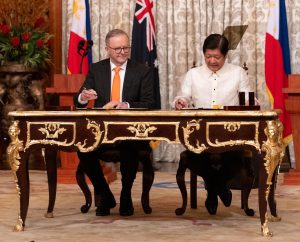On Friday, Australia and the Philippines agreed to elevate their relationship to the level of a strategic partnership, amid the intensifying frictions in the South China Sea. Prime Minister Anthony Albanese and Ferdinand Marcos signed the agreement during the Australian leader’s state visit to Manila, the first in two decades.
The upgrade has been accompanied by a number of economic cooperation measures, including the liberalization of working visas for Filipinos wanting to work in Australia and increased agricultural cooperation. But it is the security aspect that will rightly attract most attention, with the two nations agreeing to convene an annual meeting of defense chiefs, and Australia confirming its earlier intention to run joint naval patrols with the Philippines through the South China Sea for the first time.
According to The Associated Press, Albanese said that Australia and the Philippines “have common views about the need to uphold international law, and Australia’s position on that will continue to be consistent, as we have always been, including recently over issues relating to the South China Sea.”
The past year has seen an intensification of Chinese pressure in the waters that it contests with the governments of the Philippines, Malaysia, Brunei, and Vietnam. On August 5, a China Coast Guard (CCG) vessel blocked and shot a water cannon at a Philippine navy-chartered supply boat in the vicinity of Second Thomas Shoal in the Spratly Islands. The Chinese actions forced the ship to abandon its attempts to resupply the Sierra Madre, a decrepit World War II-era ship that was intentionally grounded in the shoal’s shallow waters in 1999. Australia was among the foreign governments that condemned the Chinese action.
During Albanese’s visit, Marcos thanked him for his support in the Philippines’ disputes with China in the South China Sea. This included the supportive comments that the Australian leader made at last week’s Association of Southeast Asian Nations (ASEAN) summits in Jakarta, where he underscored Canberra’s recognition of the 2016 arbitration ruling, in a case brought by the Philippines, that ruled that China’s expansive South China Sea claims had no basis in international law.
“A word of thanks to you, Mr. Prime Minister for the strong support that you have made for the Philippines…where you have made very clear that the claims that are being made upon our Philippine maritime territory are not valid, have not been recognized and are not consistent with international law,” he said, Australia’s ABC News reported.
“To have friends like you, and partners like you, especially on that subject is very gratifying and encourages us to continue down that path.”
Indeed, even while Albanese was in Manila, CCG vessels “swarmed” another Philippine convoy seeking to resupply Second Thomas Shoal, though the Philippine ships managed to breach the blockade and complete their mission.
As with its security ally, the United States, the Philippines’ relationship with Australia has advanced quickly under President Ferdinand Marcos Jr., after a period of stagnation under his predecessor Rodrigo Duterte. Marcos has adopted a firmer stance on the country’s maritime claims, and done much more to publicize Chinese incursions to the outside world, including by inviting the international and domestic media to accompany recent resupply missions.
As ABC News noted, Albanese’s followed visits by Deputy Prime Minister Richard Marles last month and Foreign Minister Penny Wong in May. During her visit, Wong announced that Australia would provide surveillance drones and other high-tech gear to the Philippine Coast Guard, while Marles, who visited to observe joint military exercises between the Australian and Philippine militaries, said that joint patrols between the two nations would “happen soon.”
While Australia and the Philippines both have strong interests in consolidating and expanding the economic relations between them, security cooperation, born of a shared concern about China’s claims over the South China Sea, are the clear driver of the new strategic partnership. Like the Comprehensive Strategic Partnership that was brokered yesterday between Vietnam and the United States, this latest development in Philippine-Australia relations has been very much made in Beijing.

































